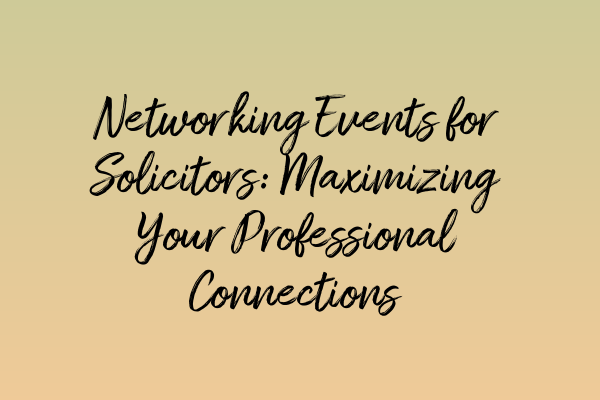Networking events can be a valuable opportunity for solicitors to establish and expand their professional connections. These events provide a platform for solicitors to build relationships, exchange knowledge, and potentially generate new business opportunities. However, to truly maximize the benefits of attending networking events, solicitors need to approach them strategically and with a clear plan in mind. In this article, we will explore some key strategies and best practices for solicitors to make the most out of networking events.
1. Set Clear Goals
Before attending any networking event, it is crucial to define your objectives. What do you want to achieve by attending this event? Are you looking to meet potential clients, establish connections with other solicitors, or learn about the latest industry trends? Setting clear goals will help you focus your efforts and make the most of your time at the event.
2. Do Your Research
Prior to the event, it is important to research the attendees and the event itself. Look for information about the speakers, sponsors, and other participants. This will help you identify potential connections and relevant discussion topics. It also demonstrates your preparedness and genuine interest in engaging with fellow professionals.
For example, if you are attending a networking event focused on criminal law, you may come across speakers who have expertise in private prosecutions. In such cases, you can discuss topics related to non-governmental prosecutions in criminal cases, as explained in this article on our website. This kind of knowledge can make your conversations more meaningful and allow you to stand out.
3. Be Prepared with Conversation Starters
Walking into a room full of strangers can sometimes feel overwhelming. To break the ice and initiate meaningful conversations, it is helpful to have a few conversation starters prepared in advance. These can be open-ended questions about recent industry developments, opinions on specific cases, or any other relevant topic. By showing genuine interest in others, you can quickly establish rapport and create connections that may lead to future collaborations.
4. Actively Listen and Engage
Networking is a two-way street. While you may have your own objectives, it is equally important to listen and engage with others. Ask follow-up questions, seek opinions, and offer insights based on your own experience. Actively listening not only shows respect, but also allows you to understand others’ perspectives and identify potential areas of collaboration or support.
For example, you may engage in a discussion about the rights of the accused during criminal proceedings, as highlighted in this article on our website. By actively participating in conversations related to your area of expertise, you can establish yourself as a knowledgeable professional and potentially attract new clients or referrals.
5. Follow Up After the Event
Attending a networking event is just the beginning. To truly maximize the benefits, it is important to follow up with the connections you make. Send personalized emails or connect on professional networking platforms to express your appreciation for the conversation and discuss any potential next steps. Building and nurturing relationships requires consistent effort and ongoing communication.
Conclusion
Networking events offer solicitors valuable opportunities to expand their professional connections, generate business opportunities, and exchange knowledge. By setting clear goals, doing proper research, preparing conversation starters, actively listening and engaging, and following up, solicitors can maximize the benefits of attending these events. So make the most of your next networking event and take your professional connections to the next level!
If you’re interested in learning more about criminal law procedures, be sure to check out our comprehensive guide. We also offer insights into the differences between Magistrates’ Court and Crown Court in this article. Additionally, our article on protecting vulnerable witnesses in criminal trials provides best practices and legal safeguards worth exploring.


Leave a Reply